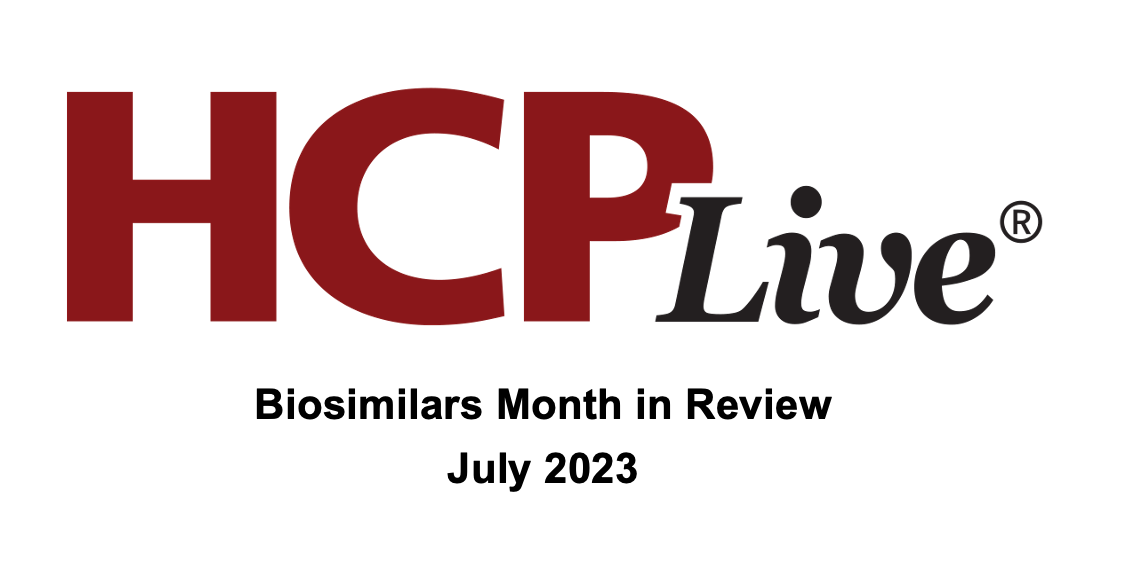News
Article
Biosimilars Month in Review: July 2023
Author(s):
The biosimilar month in review highlights the July 1 launch of 7 adalimumab (Humira) biosimilars in the United States (US) and the cost-saving potential of increased biosimilar availability.

US Launch of Adalimumab Biosimilars
On July 1, 7 adalimumab biosimilars became available in the US market, including adalimumab-bwwd and adalimumab-adbm, further increasing the treatment options available for patients with a variety of chronic autoimmune diseases, such as rheumatoid arthritis, psoriatic arthritis, plaque psoriasis, and ulcerative colitis. These biosimilars offer a more affordable cost and expand much-needed access to adalimumab.
Biosimilar Adalimumab-bwwd is Now Available to Patients in the US
Organon and Samsung Bioepis announced the US launch of the adalimumab biosimilar, adalimumab-bwwd (HADLIMA), on July 1, 2023. The citrate-free high-concentration formulation (100 mg/mL) of adalimumab-bwwd was previously approved by the US Food and Drug Administration (FDA) in August 2022 and is also available in a citrate-containing low-concentration (50 mg/mL).
The drug, which is administered using pre-filled pens (PushTouch autoinjector) or pre-filled syringes, is now available at list price ($1038), which represents a discount of 85% in comparison with the reference product.
Juliana Reed, MS: The Role of PBMs in US Adalimumab Biosimilars Launch
HCPLive Rheumatology interviewed Juliana Reed, MS, executive director of the Biosimilars Forum, to discuss the recent launch of the adalimumab biosimilars and what this development means for patients and physicians.
Reed emphasized in an ideal scenario, this increased availability would lead to competition, cost savings, and better access to medicines. However, she and her team are concerned about a few factors. Firstly, access to the market is controlled by 3 pharmacy benefit managers (PBMs) that hold 80% of the market share. Additionally, the PBM model favors high-rebate products, which means companies often have to launch their products with a dual pricing structure, one with a high rebate and one with a lower price.
Advancing Access to Affordable Treatment: The US Launch of Adalimumab-adbm
The introduction of adalimumab-adbm (Cyltezo®), the only US Food and Drug Administration (FDA)-approved Interchangeable biosimilar to adalimumab (Humira®), was an important step in expanding access to more affordable treatment options for patients living with a variety of inflammatory conditions. In an interview with HCPLive Rheumatology, Stephen Pagnotta, executive director and Biosimilar commercial lead at Boehringer Ingelheim, discussed the importance of this availability, the significance of an interchangeable designation, and the next steps for his team.
“We believe the value extends beyond the product. We collaborate with the FDA, healthcare systems, payors, and patients to develop policies and programs that provide healthcare providers and patients with continuity of care and a high level of confidence in biosimilars,” Pagnotta explained. “We are dedicated to improving the lives of patients by promoting the use of biosimilars to expand overall treatment options and contribute to the quality and sustainability of the US healthcare system.”
Cost-Saving Potential of Biosimilar Availability
Biologic disease-modifying antirheumatic drugs (bDMARDs) are a mainstay treatment modality for many rheumatic musculoskeletal diseases. Although these drugs are considered safe and effective options for the treatment of these conditions, their high price point limits the availability for many patients, particularly for those in lower- and middle-income (LAMI) countries. Therefore, the availability of biosimilars may increase access and generate savings due to on-market competition and the renegotiation of bio-originator drug prices.
Study Demonstrates Potential Cost Savings of TNF Inhibitor Biosimilars
A nation-wide Polish analysis of the estimated and real-life direct cost-savings for tumor necrosis factor (TNF) inhibitor biosimilars emphasized the need for transparent criteria for reinvesting savings on both a local and international level.
“Biosimilar-related reduction in TNF prices mainly led to reduced expenditure within the rheumatic musculoskeletal disease sector of Polish healthcare,” investigators concluded. “Our findings illustrate the extent of real-life (in contrast to the expected) patient-level benefits in a LAMI country and demonstrate how a reductive fiscal policy (with stringent reimbursement and restrictive prescription) constricts biologic accessibility.”
Biosimilars Increased Utilization, Reduced Price in European Markets
Continued biosimilar competition resulted in increased utilization and decreased price, according to recent research published in Frontiers in Pharmacology. Investigators noted trends in market shares may be indicative of a biosimilar first-mover advantage, while pricing strategies designed to be anti-competitive could limit market uptake. Additionally, a heterogenous rate among TNF-alpha inhibitors was observed.
The average market share captured by the first biosimilars was at least 2 times as large as the second biosimilars for all molecules evaluated. The sharp reductions in price per defined daily dose (DDD) of adalimumab in most countries assessed demonstrated a pricing strategy resulting in low uptake of adalimumab biosimilars.
The use of infliximab, adalimumab, and etanercept following biosimilar entry increased by 88.9%, 22.4%, and 14.6%, respectively. However, the introduction of biosimilar competitors was not correlated to an increase in treatment access for these molecules across all European countries. This indicated a shift in biosimilars use from 1 molecule to another.





